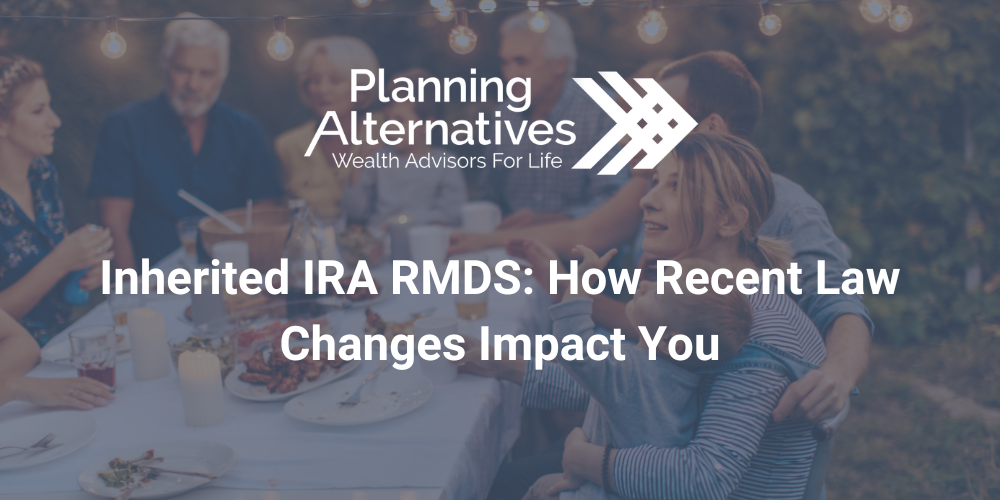IRAs (Individual Retirement Accounts) represent the largest pool of assets held in U.S. retirement accounts, with $11.5 trillion invested at the end of 2022. [i] The passing of assets to successive generations, known as the Great Wealth Transfer, is already in motion. But the rules have changed on inherited IRA RMDs (Required Minimum Distributions). If you’re not up to date on these modifications, you might unintentionally create financial hurdles for your beneficiaries and heirs down the line.
Understanding Inherited IRA RMDs
Required Minimum Distributions (RMDs) are amounts the IRS requires you to withdraw every year from traditional IRAs. These withdrawals are subject to ordinary income tax. Typically, for your own IRA, you are required to begin taking RMDs starting at age 72 (or 73 if you reach age 72 after Dec. 31, 2022). [ii] In 2033, the RMD age increases to 75.
But what happens when you inherit an IRA? Those who inherited IRAs before 2020 can stretch out withdrawals over their life expectancy, which minimizes taxes due. Due to recent tax law changes, the landscape is quite different for those who inherit an IRA starting in 2020 or later. In that case, the IRS requires beneficiaries to take distributions—and pay the accompanying taxes—much sooner.
New Tax Regulations Impacting Inherited IRA RMDs
Heirs who inherit traditional IRAs starting in 2020 or later have two options:
- Take a lump sum and pay taxes on the total amount.
- Transfer the proceeds into an inherited IRA that must be fully depleted within 10 years after the original account owner’s death. [iii] This option is referred to as the “10 year rule.”
Leaving an IRA to your Spouse
If your spouse inherits your IRA, they have more flexibility. They can treat the inherited IRA as their own or roll it over into their existing IRA. This effectively defers RMDs until they reach the age required to start taking them. This strategy works well for younger spouses who might not need immediate income and want the assets to continue growing tax-deferred.
Leaving an IRA to Your Child (RMD Exceptions for Minors)
Children over the age of majority (18 in most states) are treated as general beneficiaries. The situation is different if your child is still a minor when they inherit an IRA from you. Since a minor can’t legally manage inherited assets, a guardian is usually appointed to oversee the IRA until the child reaches legal adulthood. RMDs are not required during this time. However, once the child reaches legal age, they generally need to withdraw the remaining IRA funds within ten years. [iv]
However, other exceptions are available. If the child pursues advanced education that meets IRS guidelines, they may apply for an extension for withdrawal. In this case, they can delay the start of the 10-year rule countdown up to age 26. Please note this regulation is for children only; it does apply to non-related minors or grandchildren. [v]
Inherited RMD Relief in 2023
The Treasury Department issued new proposed regulations in February 2022 that clarified how the 10-year rule can apply on inherited retirement accounts. This clarification outlined the RMDs a beneficiary would have to take based on their life expectancy if the original account owner died after reaching their required beginning date (RBD). This change would require the beneficiary to take RMDs for the first nine years of the 10-year period, before then taking a full distribution by the end of year 10.[vi]
With these proposed regulations, the IRS was prompted to provide interim guidance in October 2022. This interim guidance (Notice 2022-53) states that those who inherited retirement accounts after 2019 where the owner died post-RBD and did not take an annual distribution in 2021 or 2022, would not be penalized. Now in 2023, heirs that have been subjected to the 10-year rule are not sure if they should take a distribution this year since the proposed regulations and interim guidance remain murky.
This past summer, on July 14, an extension of the interim guidance outlined in Notice 2022-53 was extended by the IRS in Notice 2023-54, meaning those who inherited an account will not be penalized if they do not take an RMD in 2023.
Inherited IRAs and Family Wealth Transfers: The Bigger Picture
So, what does all of this mean for your long-term family wealth planning?
- Diversify. Given these changes, relying solely on traditional IRAs for your family wealth transfer may mean your heirs end up sharing more of your wealth with the IRS. Consider diversifying assets into Roth IRAs, which are tax-free upon withdrawal, or taxable brokerage accounts, where beneficiaries might inherit the assets with a stepped-up basis, potentially reducing capital gains taxes. (Please note specific tax treatment for basis varies by state.) [vii]
- Revisit Beneficiary Designations. Strategies such as splitting an IRA between multiple beneficiaries could help ease the tax burden, or naming a younger spouse as a primary beneficiary might offer better tax deferral opportunities.
- Consult Your Tax Professional. As with any significant tax law change, be sure to consult with your tax professional to ensure you are interpreting the details appropriately and to analyze your options.
In summary, given the significant shift in the inherited IRA RMD landscape, now is the time to adapt your family wealth planning strategies accordingly.
[i] U.S. Retirement Assets: Data In Brief
[ii] Required Minimum Distributions – IRS
[iv] How Do You Name a Minor as Beneficiary of a Retirement Account
[v] Designating a Minor as an IRA Beneficiary
[vi] IRS Allowing Heirs to Skip RMDs
[vii] Step-Up in Basis: Definition, How it Works for Inherited Property
